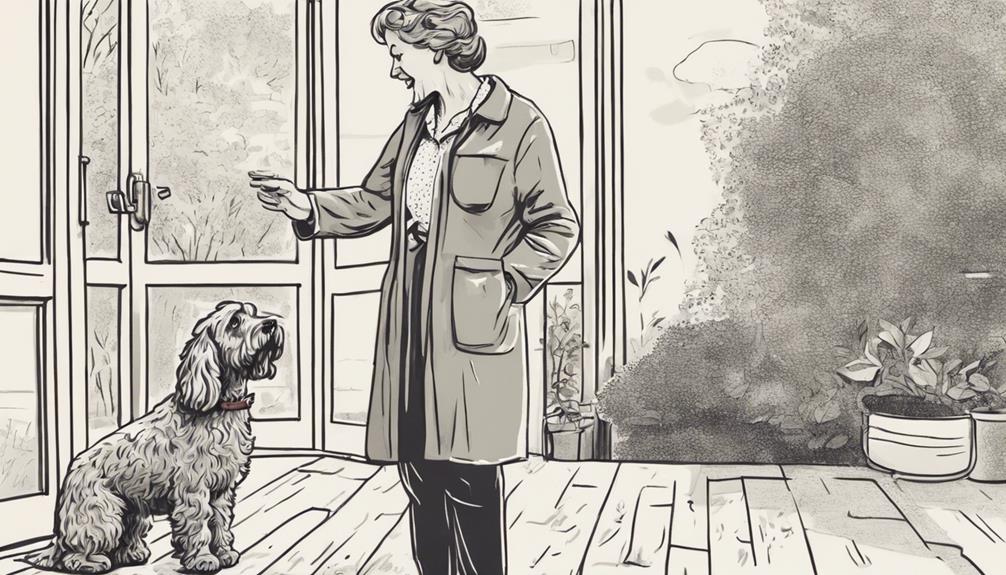Yes, your cockapoo can be a bit chatty
Let’s be honest, your cockapoo can sometimes bark up a storm. But don’t worry, it’s not out of the ordinary for this breed. Cockapoos are known for being smart and social, so barking is just their way of communicating and releasing energy. Their barking isn’t necessarily excessive or problematic. It could be caused by things in their environment, health issues, their high energy levels, or simply wanting your attention. The good news is that with proper training and understanding what triggers their barking, you can manage those vocal outbursts. As you learn more about cockapoos, you’ll discover ways to curb the barking and techniques to bond with your furry friend.
Key Takeaways
- Cockapoos can bark excessively due to their high energy levels, intelligence, and emotional sensitivity.
- Their barking can be influenced by environmental triggers, boredom, anxiety, and lack of training.
- Groomed and well-trained cockapoos are known to bark less.
- Regular physical and mental stimulation can help manage a cockapoo’s barking.
- Despite their barking tendencies, early socialization and understanding their triggers can significantly reduce excessive barking.
Understanding the Cockapoo Breed

To really get why cockapoos bark so much, you first need to understand this breed’s unique traits. Cockapoos are a mixed breed, combining a cocker spaniel and a poodle. They inherit traits from both parent breeds, like intelligence, loyalty, and a strong desire for companionship. Understanding these traits will help you interpret their barking behaviors.
Cockapoo health issues also play a role. Like any breed, cockapoos can suffer from conditions like hip dysplasia, allergies, and ear infections. These health problems can lead to changes in behavior, including increased barking. Being aware of potential health concerns will help you recognize if your cockapoo’s barking is abnormal.
Grooming needs are equally important. A cockapoo’s coat is usually dense and wavy, requiring regular grooming to prevent matting and skin irritation. Poor grooming can cause discomfort, which might increase barking. So a well-groomed cockapoo isn’t just happier, but potentially quieter too.
What Influences a Dogs Barking?
Understanding what influences a dog’s barking, like their environment, health, and training, can help you better manage your cockapoo’s vocal habits. Remember, barking is how dogs communicate. They don’t bark just to annoy you; they’re trying to tell you something.
Consider these common barking triggers:
- Environment: Loud noises, strangers, or other animals may frighten your dog, causing them to bark.
- Health: If your dog is in pain or discomfort, they might bark more than usual.
- Training: Dogs without proper training or socialization often resort to barking as their primary means of communication.
- Attention seeking: Dogs often bark when they’re bored or want your attention.
Cockapoos: Barking or Just Talking?

While it’s important to identify what triggers your cockapoo’s barking, it’s also important to distinguish between barking and “talking.” Cockapoos, like many dogs, communicate in different ways. Barking and whining are two of those ways, each with a specific purpose. Understanding the difference will help you bond with your cockapoo and have a harmonious relationship.
Here’s a simple breakdown:
| Communication Style | Purpose |
|---|---|
| Barking | Grabbing attention, expressing excitement or distress |
| Whining | Displaying submission, seeking comfort or indicating pain |
Barking is typically a loud, sharp sound. It’s your cockapoo’s way of grabbing your attention, expressing excitement, or signaling distress. Whining, on the other hand, is softer and more continuous. It’s often a sign of submission, a plea for comfort, or an indication of pain.
It’s important to note that excessive barking or whining can signal underlying issues. A sudden change in how your cockapoo communicates should not be ignored. Understanding these nuances will help you provide the care they need and strengthen your bond.
Training Your Cockapoo Not to Bark
When dealing with your cockapoo’s barking habits, there are proven, effective training approaches to prevent unnecessary barking. Understanding your dog’s needs and using the right strategies can help.
Here’s a list of the strategies you can apply:
- Using bark deterrents effectively
- Incorporating puppy socialization
- Rewarding quiet behavior
- Ignoring undesirable barking
Bark deterrents like ultrasonic devices can discourage unwanted barking by producing a sound only dogs can hear. But use these responsibly, not as punishment.
Socializing your puppy from a young age helps them get used to different environments, people, and animals, reducing their need to bark out of fear or anxiety.
Rewarding your cockapoo when they’re quiet can reinforce this behavior. When they don’t bark in a situation they normally would, praise them or give a treat.
Ignoring your dog when they bark unnecessarily can also discourage the behavior. If they learn barking won’t get your attention, they’re more likely to stop.
Factors Affecting a Cockapoos Barking

Before you can stop your cockapoo’s excessive barking, you need to understand what might trigger this behavior. These “barking triggers” vary from dog to dog, but common ones include boredom, anxiety, and noise sensitivity.
Let’s break it down with examples and solutions:
| Barking Triggers | Impact on Dog | Suggested Solution |
|---|---|---|
| Boredom | Constant barking | Provide more toys and exercise |
| Anxiety | Panic-induced barking | Training or calming products |
| Noise sensitivity | Barking at loud noises | Calming products or noise desensitization |
| Lack of training | Barking for attention | Consistent, reward-based training |
| Physiological needs | Barking when hungry, thirsty, or needing to potty | Regular feeding and potty breaks |
Each dog is unique, so observe your cockapoo closely to figure out what’s causing the excessive barking. Is it loud noises? Boredom? Or a basic need? Once you identify the trigger, you can find a solution for a peaceful home and happy cockapoo. Remember, a calm, quiet environment benefits both you and your pet.
Common Reasons for Excessive Barking
While barking triggers can vary, there are some common reasons why your cockapoo might be barking excessively. Understanding these can help you address the behavior.
- Boredom: Just like humans, dogs can get bored. When they do, they might start barking just to pass the time.
- Separation anxiety: This is a prevalent reason for excessive barking. Your cockapoo might feel anxious when you’re not around and express this anxiety through barking.
- Lack of exercise: Cockapoos are energetic breeds that need regular exercise. If they don’t get enough, they might use barking as a way to release pent-up energy.
- Seeking attention: If your cockapoo feels ignored, they might bark to grab your attention.
In each scenario, your cockapoo isn’t just making noise for no reason. There’s an underlying cause for the barking. Recognizing and understanding these “bark triggers” can help you form a stronger bond with your furry friend while also addressing the root issue. This can bring peace to your home and a greater sense of security for your cockapoo.
Calming Techniques for Barking Cockapoos

To help curb your cockapoo’s excessive barking, you can use several calming techniques that are effective and gentle. One highly recommended method is using Bark Control Devices. These devices emit a high-frequency sound that’s unpleasant for dogs but not harmful. When your cockapoo starts barking, the device triggers, and the sound discourages them from continuing.
Another popular calming technique is Soothing Music Therapy. This involves playing calming music for your dog, which can be very effective during stressful or anxious times. Just like music soothes humans, it’s been shown to have a similar calming effect on dogs. You can even find music specifically designed for dogs online.
Cockapoo Temperament and Barking
Understanding your cockapoo’s temperament is key to managing their barking habits. These dogs are known for being lively and outgoing, which can often lead to increased vocalization. This breed’s charming, social personality is part of why they’re so loved, but it can also contribute to their barking tendencies.
Consider these aspects of a cockapoo’s temperament and how they relate to barking:
- Outgoing Personality: Cockapoos are naturally friendly and sociable dogs. They love being around people, and their barking can be a way of expressing their excitement or seeking attention.
- High Energy Levels: These dogs are brimming with energy. If not properly exercised, this energy can be expressed through excessive barking.
- Intelligence: Cockapoos are smart dogs. They can become bored easily, and barking can be a symptom of their boredom.
- Emotional Sensitivity: Cockapoos are sensitive and can bark in response to changes in their environment or emotional state.
Early socialization can help manage a cockapoo’s barking habits. Bark control devices can also be effective, but it’s important to consider your cockapoo’s unique temperament before deciding on a barking solution.
How to Manage a Barking Cockapoo

Effectively managing your cockapoo’s barking involves understanding their specific triggers, providing plenty of physical and mental exercise, and using consistent training methods. Bark collars are one method, but should be used with caution. Studies show they’re not always the most effective or humane option.
Cockapoos are prone to separation anxiety, which can lead to barking. So it’s critical to address any anxiety issues promptly. Provide a secure environment, establish a routine, and use positive reinforcement for quiet behavior.
Here’s a summary of key strategies:
| Strategy | Description | Effectiveness |
|---|---|---|
| Understanding Triggers | Determine what causes your cockapoo to bark | Highly Effective |
| Physical Stimulation | Regular exercise to help manage energy levels | Highly Effective |
| Mental Stimulation | Training, toys, and puzzles to keep them engaged | Moderately to Highly Effective |
| Bark Collars | Use as a last resort, not always effective or humane | Varies |
Frequently Asked Questions
Can a Cockapoo’s Diet Affect Its Barking Behavior?
Yes, your cockapoo’s diet can influence its barking habits. Certain foods may trigger allergies causing discomfort, which leads to excessive barking. So watch what you feed them – it might just quiet them down.
Are There Specific Medical Conditions That Can Cause a Cockapoo to Bark Excessively?
Yes, certain medical issues can trigger excessive barking in cockapoos. Pain or discomfort often induces more barking. Anxiety triggers, like changes in environment, can also cause these sensitive dogs to bark more.
How Long Does It Usually Take to Train a Cockapoo to Reduce Its Barking?
Training your cockapoo to reduce barking can take several weeks to a few months. It depends on understanding their triggers and using consistent training techniques. Patience and persistence are key.
Does a Cockapoo’s Age Have Any Influence on Its Barking Habits?
Yes, a cockapoo’s age can influence its barking habits. Barking triggers and the breed’s temperament play a role. As they mature, properly socialized cockapoos typically bark less once they understand their environment better.




